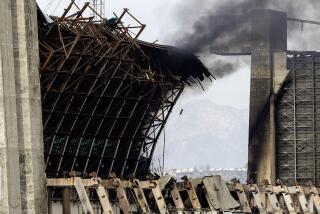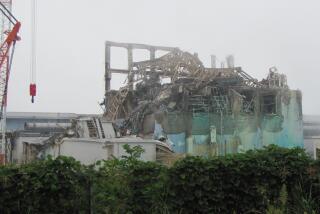U.S., Japan Reportedly Reach Deal to Clean Up Incinerator Near Navy Base
- Share via
TOKYO — The United States and Japan have reached a deal to clean up an incinerator that the U.S. Navy says has spewed toxic chemicals over an American base in Japan and which has been an irritant in the two countries’ relationship for years, a senior U.S. official said Wednesday.
The two countries planned to announce a deal today--a day after Defense Secretary William S. Cohen’s arrival here for a two-day visit--under which the Japanese will provide money to clean up the Shinkampo industrial incinerator next to Atsugi Naval Air Facility, about 20 miles southwest of Tokyo.
The incinerator emits 38 chemicals in unacceptable concentrations, including dioxin, lead and benzene, Navy tests have shown. Recent testing of the incinerator showed that it was generating the highest levels of dioxin ever recorded in Japan, according to U.S. officials. Smoke from the plant often blows across the naval facility and a day-care center.
The emissions have given Navy personnel and family members respiratory and other ailments, U.S. officials say, forcing a number of families to leave the area to avoid further risks to their health.
U.S. officials had threatened to take the Japanese government to court, or to move the personnel elsewhere.
The U.S. official, who declined to be named, wouldn’t provide details of the agreement but said the deal will be “comprehensive” and “very, very expensive.” The Japanese “will pick up the bill completely,” he said.
The U.S. military often finds itself the target of complaints about noise and pollution from its bases around the world. In this case, the tables have been turned, and U.S. officials have complained--and gotten little satisfaction until now.
Similar incinerators operate legally at various places around the country, the U.S. official noted.
The plant’s owner, Tetsuro Murata, has complained about U.S. “pushing and shoving” with demands for pollution abatement steps that would be expensive. He has demanded that the Japanese government buy the incinerator from him.
Cohen has made solving the problem a priority and has received cooperation from his Japanese counterpart, Defense Agency chief Tsutomo Kawara, U.S. officials said. The two top defense officials were expected to announce the agreement at a news conference today at Atsugi.
In meetings today with Kawara, Prime Minister Keizo Obuchi and other senior officials, Cohen will also take up a second nettlesome issue: the $5-billion annual “host nation support” payments that the Japanese have been paying to defray the cost of keeping 47,000 U.S. troops in the country.
In January, Japanese officials told the Pentagon that they needed to reduce the payment because of financial pressures on their budget. But the senior U.S. official said he is confident that the Japanese will decide to provide “roughly” the sum they are paying now.
“Both sides understand the strategic importance of host nation support, and we’re hopeful to reach an agreement to continue at roughly the same level,” the defense official said.
Cohen said the payments are “important for us and for them. I know they are having some economic trouble right now, but host nation support will be very, very key to us.”
Cohen arrived in Tokyo late Wednesday after a three-day trip to Vietnam, the first by a U.S. defense secretary since the Vietnam War.
On the last day of his trip to the Southeast Asian nation, Cohen met with Vo Viet Thanh, who, as chairman of the Municipal People’s Committee of Ho Chi Minh City, the former Saigon, acts much like a mayor. Thanh, considered an economic reformer, stressed his commitment to growth and praised Cohen’s efforts to strengthen bilateral ties.
The Vietnamese have been worried that signs of a budding U.S.-Vietnamese relationship could alarm the neighboring Chinese. But Thanh said Cohen’s effort to move the two nations past the legacy of the war “shouldn’t make anyone worried.”
More to Read
Sign up for Essential California
The most important California stories and recommendations in your inbox every morning.
You may occasionally receive promotional content from the Los Angeles Times.













